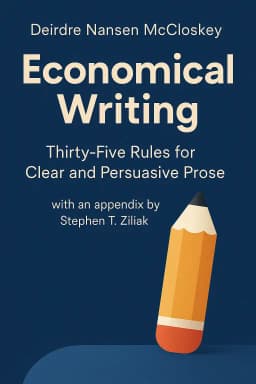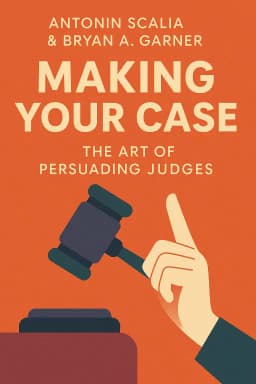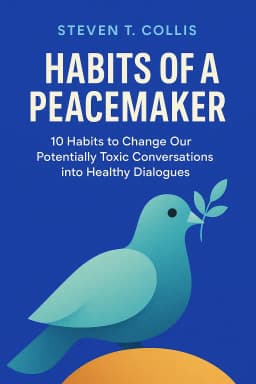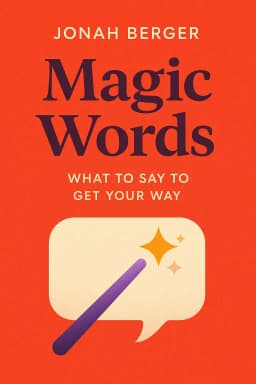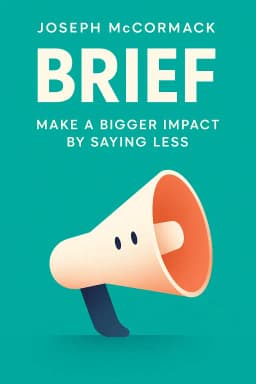
The 8-Second War
Make a Bigger Impact by Saying Less
Golden Hook & Introduction
SECTION
Michelle: The average human attention span is now eight seconds. A goldfish can hold a thought for nine. Mark: Hold on, are you serious? A goldfish? Michelle: I am completely serious. That means a tiny, swimming cracker has more focus than the executive you're trying to pitch. Today, we're learning how to win that eight-second war. Mark: Wow. Okay, that's a terrifying way to start. So we're basically all competing with goldfish now. Who is our general in this eight-second war? Michelle: Our guide is Joseph McCormack in his book, BRIEF: Make a Bigger Impact by Saying Less. Mark: McCormack. What's his story? Is he just another communication guru telling us to use more bullet points? Michelle: Far from it. This is what's so fascinating. He developed these techniques not for corporate boardrooms initially, but for the U.S. Army Special Operations Command. We're talking elite soldiers in high-stakes environments where unclear communication can have life-or-death consequences. Mark: Whoa. Okay, so this isn't just about making your emails less annoying. This is about communication under extreme pressure. That changes things. Michelle: It absolutely does. It reframes the entire idea of brevity from a "nice-to-have" soft skill into a critical, strategic weapon. Mark: I'm listening. My eight seconds are all yours.
The Attention Deficit Apocalypse: Why Your Words Are Failing
SECTION
Michelle: The core problem McCormack identifies is that most of us are communicating as if we still live in the 1990s. We think more information equals more persuasion. We build these massive, detailed arguments, believing our thoroughness will impress people. Mark: Right, you want to show you've done the homework. You want to cover all the bases so no one can poke a hole in your logic. It feels like the responsible thing to do. Michelle: It feels responsible, but it's actually disastrous. He tells this perfect, painful story about a marketing executive named John. John is preparing for a huge tech conference. He has a new product line, and he needs to secure funding. He spends weeks, literally weeks, compiling data, creating dozens of intricate slides, and rehearsing. Mark: Oh, I know this guy. I think I am this guy sometimes. He's got charts, graphs, appendices... the works. Michelle: Exactly. He gets on stage, and he starts with a long history of the company. Then he dives into market trends, explaining every single data point on his charts in excruciating detail. He thinks he's building an unshakeable case. Mark: But what's happening in the audience? Let me guess. It's a sea of glowing phone screens. Michelle: A sea of glowing phones. The potential investor he's trying to impress, a woman named Sarah, is scrolling through her email. The influential tech blogger, David, is literally dozing off in the front row. The rest of the audience is either whispering or just staring with that classic glazed-over expression. Mark: That is just painful to hear. It’s a train wreck in slow motion. We've all been in that audience, and worse, some of us have been that presenter. Why do we do it? Why do we feel the need to bury people in details? Michelle: McCormack says it comes down to what he calls the "Seven Capital Sins" of communication. We don't have time for all seven, but a few really stand out. One is Cowardice. Mark: Cowardice? That sounds harsh. Michelle: It is, but it's true. It's the fear of leaving something out. The fear that if you don't mention every single detail, someone will think you're unprepared or, even worse, find a flaw. So you just dump everything on them as a defense mechanism. Mark: That makes a lot of sense. It’s a "cover your assets" approach to communication. What's another one? Michelle: Confidence. Or rather, overconfidence. It's the mistaken belief that your audience is as interested in the topic as you are. John, the presenter, was passionate about his product. He assumed everyone else would be too. He couldn't imagine anyone finding his detailed charts boring. Mark: Yeah, the classic curse of knowledge. You're so deep in the weeds you forget that other people just want to know if it's going to rain, not a full meteorological breakdown of the cold front. Michelle: Precisely. And the outcome for John was catastrophic. The investor left early. The blogger wrote a scathing review about the presentation's length and lack of focus. The company missed the investment, and the product line fizzled out. All because he said too much. Mark: That story is a perfect illustration of the problem. It’s not just about being boring; it has real, tangible, career-damaging consequences. It's interesting, though. Some readers have pointed out the irony that a book about being brief is around 200 pages long. Michelle: It's a fair point, and it highlights the challenge. Becoming brief requires a significant rewiring of our habits. The book isn't just a single command to "be shorter." It's a detailed training manual for a new kind of mental discipline. He has to unpack why we fail, and then provide a whole toolkit to fix it. Mark: Okay, so it's less of a pamphlet and more of a boot camp. You need the full course to de-program all those bad habits we've built up. Michelle: That's the perfect way to put it. He's not just giving you a fish; he's teaching you how to fish in a world where the fish have the attention span of... well, a goldfish.
The BRIEF Toolkit: From Rambling Mess to Razor-Sharp Message
SECTION
Mark: So if we're all living in this attention apocalypse, and our old methods are getting us killed on stage, what's the antidote? What's in this toolkit from the Special Ops boot camp? Michelle: It starts with a fundamental shift from just talking to actually preparing. The first tool he introduces is the BRIEF Map. Mark: A BRIEF Map. Is that like a mind map? Michelle: It's similar, but more structured and purposeful. Think of it less like a brainstorm and more like a flight plan. Before you even think about opening your mouth or typing an email, you map out your message visually. You identify your core idea—the headline—and then you structure your supporting points around it. It forces you to see the logic and, more importantly, to see what's unnecessary. Mark: It’s like a recipe for a conversation. You wouldn't just start throwing ingredients in a pan and hope a cake comes out. You'd get your flour, sugar, and eggs measured and organized first. Michelle: That's a great analogy. The BRIEF Map is your mise en place for communication. It's the discipline of thinking clearly on paper before you try to communicate clearly in person. It forces you to trim the fat before you even start cooking. Mark: I can see how that would be powerful. It prevents you from discovering your point halfway through a rambling monologue. Michelle: And that leads to the next tool, which is narrative. He argues that the most effective way to deliver your mapped-out message is through a story. Our brains are not wired for bullet points; they're wired for stories. Mark: Right. A story has a beginning, a middle, and an end. It has characters and stakes. It's something you can actually follow and remember. Michelle: Exactly. And he gives this fantastic counter-example to John's failed presentation. It's about a sales executive named David. He's trying to close a massive deal with a financial institution, but the client is hesitant. They have a lot of technical concerns about integration. Mark: Okay, so the old playbook says David should write a 20-page white paper addressing every single technical query, complete with diagrams and flowcharts. Michelle: The old playbook would have him do exactly that. But David is a master of brevity. He knows the client representative, Mr. Johnson, is a busy executive who doesn't have time for a novel. So, he takes a disciplined approach. He consults his tech team and identifies the client's three most critical concerns. Just three. Mark: Only three. That takes some serious restraint. Michelle: It takes immense discipline. Then, he crafts a very short, very clear email. No jargon. No long-winded explanations. The email basically says: "Here are your three main concerns as I understand them. Here are our three direct solutions. Here are the benefits to your business." That's it. Mark: So he resisted the urge to data-dump and just... solved the problem? What happened? Michelle: Mr. Johnson, the client, was blown away. He was impressed by the clarity, the conciseness, and the respect for his time. He saw that David truly understood his problems. He forwarded that one, short email to his team, and they approved the deal almost immediately. Mark: Wow. So one brief, well-structured email saved a major deal, while a massive, detailed presentation sank one. The contrast is incredible. Michelle: It's everything. And it demonstrates the core principle: brevity isn't about saying less, it's about doing the hard work to figure out what needs to be said. It’s about clarity and impact, not volume. Mark: That discipline seems to be the key. It's a mental muscle. How do we build it? What's the workout routine? Michelle: McCormack outlines four key practices: Map It, which we've discussed. Tell It, using narratives. Talk It, which means structuring conversations to be dialogues, not monologues, by actively listening. And finally, Show It—using powerful visuals like infographics or simple diagrams to make a point instantly. It's about training yourself to think in headlines, stories, and pictures. Mark: So it's a conscious, daily practice. You have to constantly ask yourself, "What's the headline here? What's the one thing they need to remember?" Michelle: Yes. And you have to be ruthless with yourself. As McCormack puts it, "An active mind shouldn’t be the engine that runs a fast mouth." You have to filter, trim, and focus.
Synthesis & Takeaways
SECTION
Mark: Okay, so we're fighting a war against an 8-second attention span, armed with tools forged in military command centers. When we boil it all down, what's the one thing we absolutely have to remember from this? Michelle: I think the most profound insight is that brevity is a form of respect. It's not about being rude, or abrupt, or shallow. It's the ultimate signal that you value the other person's time and intelligence. In a world that is drowning in noise, clarity is the ultimate currency. Mark: That’s a powerful reframe. We think of long emails as being thorough and respectful, but they're actually the opposite. They're selfish. They're offloading the work of finding the point from you, the sender, to them, the receiver. Michelle: Exactly. You're making them wade through your stream of consciousness to find the one or two nuggets that matter. A brief message says, "I've done the hard work for you. I've thought this through, I've distilled it to its essence, and I'm presenting it to you in the clearest way possible." That builds trust and appreciation faster than any 50-page report ever could. Mark: It’s a shift from communication as performance—look how much I know!—to communication as a service. How can I serve this person's understanding in the most efficient way possible? Michelle: That's it perfectly. And it creates a virtuous cycle. When you're known as the person who gets to the point, people want to hear from you. They'll open your emails first. They'll give you their full attention in meetings, because they know you won't waste it. You become more influential by demanding less of their time. Mark: That's a fantastic paradox. So what's one practical thing our listeners can do today to start building this muscle? Michelle: Here's a simple challenge. The next time you write an important email, one that's more than a few sentences, write it all out. Get all your thoughts down. Then, before you hit send, force yourself to cut its length in half. Not by a little, by half. Find the single most important sentence—that's your new opening. Then see what else is truly essential. Mark: I love that. A 50% reduction challenge. It sounds both simple and incredibly difficult. I'd love to hear how that goes for people. Let us know what you discovered. Did it work? Was it harder than you thought? Join the conversation on our socials. Michelle: It's a challenge, but it's a worthy one. Mastering brevity is a superpower in the modern world. Mark: Couldn't agree more. This has been incredibly insightful. Michelle: This is Aibrary, signing off.
